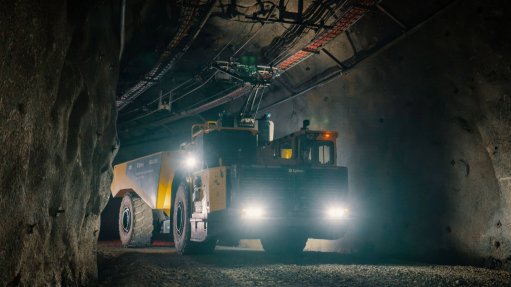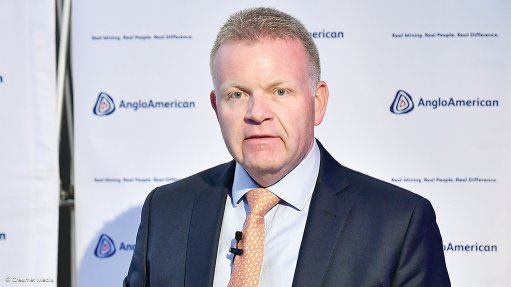Scrap export ban detrimental to sector
The Southern Africa Stainless Steel Development Association (Sassda) supports the proposed legislation to stop the economic damage caused by metal theft and infrastructure destruction.
However, this could be detrimental to the stainless steel sector because all metal waste and scrap are subjected to the scrap export ban, says Sassda executive director Michel Basson.
The Genesis Analytics report published earlier this year shows that most of the R45-billion direct damage to infrastructure is owing to copper theft with other targeted infrastructure items.
This copper theft includes railway lines (carbon steel), streetlights (copper and galvanised carbon steel), traffic lights (copper and galvanised carbon steel), manhole covers (carbon steel), trellises and fencing (carbon steel) and steel railings (carbon steel with possible stainless steel content).
“From this, it is clear that the theft of stainless steel has a small impact on the issue at hand,” notes Basson.
There is a limited local market for stainless steel scrap and waste. This market – mainly the local mill – will not require stainless steel scrap in the foreseeable future, says Basson.
The recycling and scrap export organisations in the stainless steel industry will be severely affected by the proposed scrap export ban restrictions in terms of cash flow, profitability and contractual obligations, he adds.
Additionally, Basson notes that stainless steel is an expensive input material. Fabricators do not regard scrap as waste, but rather value stainless steel scrap as an integral part of the business model and crucial for competitiveness.
“An industry standard is that fabricators will create scrap of 20% or more from the input material,” he comments.
Also included in the proposed legislation would be the ban on the importation of certain equipment deemed to be used by metal thieves to process stolen scrap. Market intelligence specialist Lesley Squires adds that, with the current increased workload in the stainless steel industry, access to this type of equipment for local fabricators and distributors is crucial.
Many fabricators, especially in the food and beverage industry, are negotiating the procurement of equipment from international suppliers, including technology such as press brakes and presses; various types of metal-cutting technology, such as laser and plasma cutters; and coil processing lines such as decoilers and coil slitters.
This type of equipment is used for the distribution of stainless steel material and the fabrication of stainless steel products and will impact the ability of the local stainless steel industry to localise currently imported products.
The lack of a market for stainless steel scrap or an artificial lowering of its value, owing to a ban on the only trade mechanism for scrap, will seriously affect the stainless steel sector’s ability to create or maintain jobs and further hamper fabricated exports, while providing a cost advantage for imported stainless steel items, adds Basson.
Further, Squires says a similar ban, aimed at supplying local demand during Covid-19, was instituted by government in 2020.
“This ban did not have a positive impact on the illegal trade in copper or damage to infrastructure.”
The legislative changes made in 2016 in terms of sentencing and bail, as well as policing improvements made in 2016, 2017 and 2022, also did not contribute to the decrease in copper theft and infrastructure damage, he adds.
Basson comments that it would be highly unlikely that the ban on the export of stainless steel scrap and waste, including semi-finished products, will have an impact on copper theft and infrastructure damage.
In terms of sustainability and the environment, research and development association Worldstainless states that 96% of end-of-life stainless steels are captured and recycled.
“This proportion is the highest global recycling rate of any recyclable material used anywhere in the world,” Basson says.
Therefore, a domestic restriction on the export of scrap will undoubtedly become a recycling constraint for the global stainless steel industry, he concludes.
Comments
Press Office
Announcements
What's On
Subscribe to improve your user experience...
Option 1 (equivalent of R125 a month):
Receive a weekly copy of Creamer Media's Engineering News & Mining Weekly magazine
(print copy for those in South Africa and e-magazine for those outside of South Africa)
Receive daily email newsletters
Access to full search results
Access archive of magazine back copies
Access to Projects in Progress
Access to ONE Research Report of your choice in PDF format
Option 2 (equivalent of R375 a month):
All benefits from Option 1
PLUS
Access to Creamer Media's Research Channel Africa for ALL Research Reports, in PDF format, on various industrial and mining sectors
including Electricity; Water; Energy Transition; Hydrogen; Roads, Rail and Ports; Coal; Gold; Platinum; Battery Metals; etc.
Already a subscriber?
Forgotten your password?
Receive weekly copy of Creamer Media's Engineering News & Mining Weekly magazine (print copy for those in South Africa and e-magazine for those outside of South Africa)
➕
Recieve daily email newsletters
➕
Access to full search results
➕
Access archive of magazine back copies
➕
Access to Projects in Progress
➕
Access to ONE Research Report of your choice in PDF format
RESEARCH CHANNEL AFRICA
R4500 (equivalent of R375 a month)
SUBSCRIBEAll benefits from Option 1
➕
Access to Creamer Media's Research Channel Africa for ALL Research Reports on various industrial and mining sectors, in PDF format, including on:
Electricity
➕
Water
➕
Energy Transition
➕
Hydrogen
➕
Roads, Rail and Ports
➕
Coal
➕
Gold
➕
Platinum
➕
Battery Metals
➕
etc.
Receive all benefits from Option 1 or Option 2 delivered to numerous people at your company
➕
Multiple User names and Passwords for simultaneous log-ins
➕
Intranet integration access to all in your organisation


















